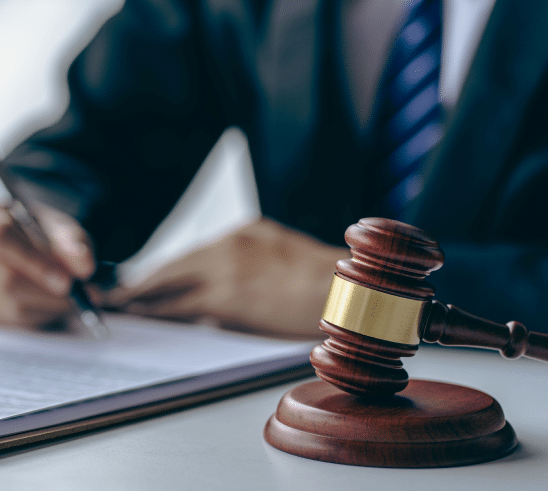According to one estimate, approximately eight percent of the entire U.S. population are convicted felons. The Brennan Center for Justice also states that even when the average convicted felon manages to avoid a prison sentence, they still experience a 22 percent reduction in future earnings. Another notable consequence is the loss of Second Amendment rights.
When considering the research, it makes sense to reduce a felony to a misdemeanor whenever possible. In the State of California, Penal Code 17(b) provides a pathway for those who wish to address their felony convictions. However, navigating this legal process can be complex—especially without assistance from an experienced criminal defense attorney.
If you’re interested in exploring your eligibility for reducing a misdemeanor conviction to a felony, Gressley & Donaldson is here to help. This article will provide an overview of this process, including eligibility requirements, a step-by-step guide, related legal matters, and more.
Need help now? Contact the dedicated Riverside criminal defense lawyers at Gressley & Donaldson to schedule a consultation and receive personalized legal advice on your case.
Penal Code § 17b – How to Reduce a Felony to a Misdemeanor
Section 17 of the California Penal Code defines felonies and describes how defendants can reduce these offenses to misdemeanors. Paragraph (b) of this section states that when an offense carries a potential prison sentence (i.e., a felony), it can be reduced to a misdemeanor under certain circumstances.
A defendant may be eligible to reduce their felony to a misdemeanor if they committed what’s known as a “wobbler” offense. Wobbler offenses are those that may be charged as either a misdemeanor or a felony, depending on the circumstances. Section 17(b) also states that only those who have been granted probation for wobbler felonies can reduce their convictions to misdemeanors. This also applies to juvenile offenses.
Does Proposition 47 Reduce My Felony a Misdemeanor?
This legal pathway was streamlined by Proposition 47, a ballot measure passed in 2014. The goal of this law is two-fold: Reduction of prison populations and new pathways to freedom for those who committed nonviolent, minor offenses.
For many defendants, the reduction of felonies to misdemeanors was guaranteed with the passing of Proposition 47. Specifically, all drug possession offenses and minor theft crimes should be reduced from felonies to misdemeanors in California. Although this process does not occur automatically, defendants should not encounter any legal challenges when reducing these felonies to misdemeanors thanks to the guarantees outlined by Proposition 47.
Steps to Reduce a Felony to a Misdemeanor
If you are interested in reducing your felony conviction to a misdemeanor, you need to follow a series of steps. If you are eligible, your attorney can help you complete the following steps in your pursuit of a conviction reduction:
- Collect as much information as possible about your felony conviction
- Identify the Superior Court that matches the jurisdiction of your felony conviction
- File a Petition for Reduction to Misdemeanor with the correct Superior Court
- Attend a preliminary hearing if you have not yet been sentenced
- If you have already been sentenced, you may still need to attend a hearing
- Negotiate with prosecutors (if applicable)
- Follow up by expunging the new misdemeanor from your record
Working closely with a dedicated criminal defense lawyer can drastically improve your chances of success. Our law firm can help guide you through the process of reducing your felony case to a misdemeanor.
What Types of Offenses Can Be Reduced to Misdemeanors?
Defendants can reduce a wide range of felonies to misdemeanors in California, including wobbler offenses. Examples of eligible infractions include the following:
- Criminal threats
- Assault with a deadly weapon
- Vehicular manslaughter
- Elder abuse
- Looting
- Embezzlement
- Animal cruelty
- Welfare fraud
- DUI with injury
- Child endangerment
- Burglary
- Grand theft
This list is non-exhaustive, and other offenses may also qualify for reduction. According to Proposition 47, the following criminal offenses may also be reduced to a misdemeanor:
- Forgery
- Passing bad checks
- Receiving stolen property with a value of under $950
- Unlawful possession of any controlled substance
- Shoplifting involving stolen goods worth under $950
Unsure whether or not your conviction is eligible for a reduction? The best way to find out is by speaking with a trusted attorney about your criminal case.
What Types of Felonies Cannot Be Reduced to Misdemeanors?
If a felony is not a wobbler offense, it is known as a “straight” felony. These types of offenses cannot be reduced to misdemeanors under California criminal law. Examples include the following:
- Murder
- Rape
- First-degree burglary
- Kidnapping
- Sale of a controlled substance
Additionally, you cannot reduce a felony to a misdemeanor if you have already served a state prison sentence. Even a partial prison sentence disqualifies you from this process, and this rule applies to suspended prison sentences as well. Lastly, serving a sentence in “county jail” may also disqualify you from relief under PC 17(b).
What if I Have Multiple Felonies?
If you have multiple felonies, you can still reduce them to misdemeanors under certain circumstances. However, all of your felonies must be “reducible” – even if you only want to reduce one. For example, you might have a first-degree burglary conviction and a felony looting conviction. The existence of the “straight” first-degree burglary conviction would prevent you from reducing your felony looting charge to a misdemeanor. If you have a felony looting conviction and a felony forgery conviction, however, you could reduce either one or both to misdemeanors since they are both wobbler offenses.
When Can an Attorney File a Motion to Reduce My Felony?
Your defense attorney can file a motion under PC 17(b) at various points during your journey through the criminal justice system. The right time to file depends on a variety of factors, and your attorney can help you decide when is most advantageous to your case. We’ll discuss a few of these times below.
Filing a Motion at the Preliminary Hearing
The preliminary hearing occurs during the “pre-trial” phase, and it presents the first opportunity to file a motion under PC 17(b). At the conclusion of your preliminary hearing, the judge may consider this motion and determine whether to reduce your wobbler offense to a misdemeanor. Note that the requirement for probation still exists, and the judge must also sentence you to only probation with no incarceration period when accepting your motion. Most defendants attempt to reduce their felonies at this stage.
Filing a Motion at the Sentencing Hearing
You may also file your motion to reduce your felony to a misdemeanor at the sentencing hearing. This hearing determines your sentence, and it may occur after a plea bargain or a criminal trial. A plea bargain may encourage the court to be more lenient, and this may include reducing your charge down to a misdemeanor. A criminal trial may also highlight mitigating factors and evidence that encourages the same degree of leniency from the court.
Filing a Motion After Completing Probation
After you have completed your probationary period and satisfied all of its various conditions, you may also file a motion for relief under PC 17(b). Note that violating your probation in any way will almost certainly make you ineligible. If the judge grants the motion at this stage, your record will be amended to indicate a misdemeanor conviction instead of a felony conviction.
What Are the Benefits of a Reduction?
The main benefit of reducing a felony to a misdemeanor involves expungement. After you reduce a felony to a misdemeanor, you can expunge the misdemeanor from your record. In other words, the court will destroy any mention of your misdemeanor on your criminal record.
For all intents and purposes, it will be as if the crime never occurred in the first place. Note that this two-stage process is the only way to remove a felony from your record, and you must reduce a felony to a misdemeanor before you can expunge it. In some cases, you will need to expunge the misdemeanor before you can enjoy certain rights again, including your ability to purchase, own, and use firearms.
That being said, reducing a felony to a misdemeanor presents a range of benefits even if you never expunge the misdemeanor. With no felony conviction on your record, job and college applications may be easier, as you can legally state that you were never convicted of a felony. You may regain your firearms rights immediately after reducing your felony to a misdemeanor, and you may also regain the right to serve on a jury or hold office. Finally, a reduction may allow you to obtain various professional licenses for which you would have otherwise been ineligible.

What Factors Are Considered When Reducing a Felony?
Judges consider a wide range of factors when considering whether or not to reduce your misdemeanor to a felony. These include:
- Criminal history and past convictions
- Your conduct during probation
- The circumstances surrounding your crime
- Good behavior
- Evidence of rehabilitation
- Completion of substance abuse programs (if applicable)
- Character reference letters
- Your age at the time of the offense
- Your personal history
- Your career opportunities
Even if you exhibited excellent conduct, have numerous character reference letters, and have complete applicable programs, your petition to reduce your felony may be denied. A dedicated attorney can help convey the importance of all of these factors and ensure your claims are bolstered by accurate documentation.
Should I Seek Expungement as Well?
Expungement is the logical next step after reducing a felony to a misdemeanor. It doesn’t make sense to go through the effort of a PC 17(b) motion without going one step further and expunging your misdemeanor. This process has the potential to completely clean your record, making it easier to get loans, employment, education, housing, and much more.
It is also worth pointing out that virtually anyone with an internet connection can check your criminal record in just a few steps. This could affect not only your professional opportunities, but also your personal relationships. However, it is worth noting that if your misdemeanor triggered a 10-year firearms ban, an expungement will not restore your gun rights. Speak to your attorney to determine whether to proceed with expungement after reducing a felony down to a misdemeanor.
Finally, it’s important to note that certain penalties may still exist even after you reduce your felony to a misdemeanor, including the mandatory 10-year firearms ban for some offenses (notably domestic violence misdemeanors). Your criminal offense may still count as a “strike” under California’s Three Strikes Law, making severe penalties more likely if you commit certain felonies in the future. There is also no way to avoid registering as a sex offender if your felony offense involved certain sex crimes.
Reducing a Felony to a Misdemeanor FAQs
California criminal law is complex, and it’s normal to have questions. The best way to find answers is by reaching out to an experienced criminal defense lawyer. In the meantime, read through the answers to some of our law firm’s most frequently asked questions.
A PC 17(b) reduction allows certain felony “wobbler” offenses to be reclassified as misdemeanors after meeting eligibility requirements. This provides significant legal and practical benefits.
You must file a petition requesting the court to reduce the felony, show eligibility, and demonstrate rehabilitation. A judge reviews the case and may grant the reduction.
Eligibility generally applies to “wobbler” offenses—crimes chargeable as either a felony or misdemeanor. You must also have completed probation successfully or meet other qualifying conditions.
You submit a formal petition to the court, notify the prosecutor, and may attend a hearing where the judge considers your background, conduct, and reason for seeking the reduction.
Benefits include improved employment prospects, restoration of certain rights, easier background checks, and reduced stigma associated with a felony record.
Yes. Once reduced, the offense is treated as a misdemeanor, making it less likely to trigger employment barriers and improving your ability to pass background checks.
Some DUI-related felonies may be eligible if they are wobblers and the defendant completed probation. Not all DUI felonies qualify.
Judges look at criminal history, completion of probation, behavior since conviction, the seriousness of the offense, and your reasons for seeking the reduction.
Yes. Completing probation is one of the strongest factors supporting PC 17(b) eligibility and increases the likelihood of success.
Requirements include having a qualifying wobbler offense, meeting sentencing conditions, and showing rehabilitation or positive post-conviction conduct.
Most petitions take between 1–3 months depending on court scheduling, case complexity, and whether the prosecution objects.
No. The conviction remains but is reclassified as a misdemeanor. You may need expungement for additional relief.
While not required, an attorney improves your chances by preparing a strong petition, gathering supporting evidence, and arguing your case before the judge.
Contact a Criminal Defense Lawyer in California Today
First-time drug offenders in California have an opportunity to dismiss their criminal case Online research can provide a basic overview of PC 17(b) in California, but no amount of reading will reduce your felony to a misdemeanor. For positive results, consider speaking with a qualified, experienced criminal defense attorney in California about reducing your criminal charges.
During your initial consultation with Gressley & Donaldson, you can discuss the specifics of your criminal record and determine the most effective way to clear your name. Remember, a felony conviction can affect your life in numerous ways; if you fail to take action, you may struggle with these consequences indefinitely. Contact our law offices to schedule a case evaluation today.



